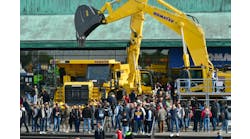According to an article by hose manufacturer Gates, it is estimated that 370 million liters of oil leak from hydraulic equipment each year. This is a staggering statistic. And even more so when you consider the same article states that as little as one liter of oil can pollute up to one million liters of water.
With the above in mind, here's a 'what if?' scenario for you: what if the environmentalists smartened up and lobbied governments to pass a law requiring all hydraulic equipment users to account for and document all deliveries and disposals of hydraulic oil?
So you'd have an opening volume, then X gallons of new oil deliveries throughout the year and X gallons of used oil sent for disposal during the same period. Any deficit between new oil purchased and used oil disposed of (after any adjustment for volume on hand) would be deemed to have gone into the environment and attract a penalty or fine on a per gallon basis.
How would your numbers, and more importantly, your deficit look - if you had to account for your hydraulic oil usage?
The only way you can know how much hydraulic oil each of your machines consumes every year - particularly if you have more than one machine under your supervision, is if you measure and record all top-offs.
In my experience, most hydraulic equipment users don't do this. But when clients have done so at my urging, they are often shocked at how much oil a particular machine is actually losing over a year.
Yeah, I know, it's one more thing to do. But it's almost impossible to control anything you don't measure. And as the late management guru Peter Drucker once said: "What gets measured, gets managed."
Of course, it's not just the cost of make-up fluid and the environmental cost you need to consider. There's the cost associated with clean-up, proper disposal and the potential safety risks posed by a leaky machine. Plus, where oil can get out, contamination can get in. And as you're reminded each time you buy a filter element, it costs money to remove contaminants. And even more if you don't.
The downtime required to fix leaks can be an issue. But this is often just used as an excuse. At one large plant, the maintenance department had estimated the cost to fix all the hydraulic oil leaks was $28,000. Management were staggered by this figure -- until they were told the current hydraulic oil consumption was around 3 drums per week at a cost of about $1350. In other words, the payback period was only 5 months!
Bottom line: allowing your hydraulic machine to be, or continue to be, a leaker is a mistake. And there are 6 others you may be making too. To check and eliminate them, get "Six Costly Mistakes Most Hydraulics Users Make... And How You Can Avoid Them!" available for FREE download here.
Continue Reading
Continue Reading
BOOK 2, CHAPTER 12: Fluid Motor Circuits
March 18, 2009
Motor leakage variations
Oct. 18, 2006
Sponsored Recommendations
Sponsored Recommendations
All-In-One DC-UPS Power Solutions
March 13, 2024
Motor Disconnect Switches
March 13, 2024
Industrial Straight-Through Cable Gland
March 13, 2024
